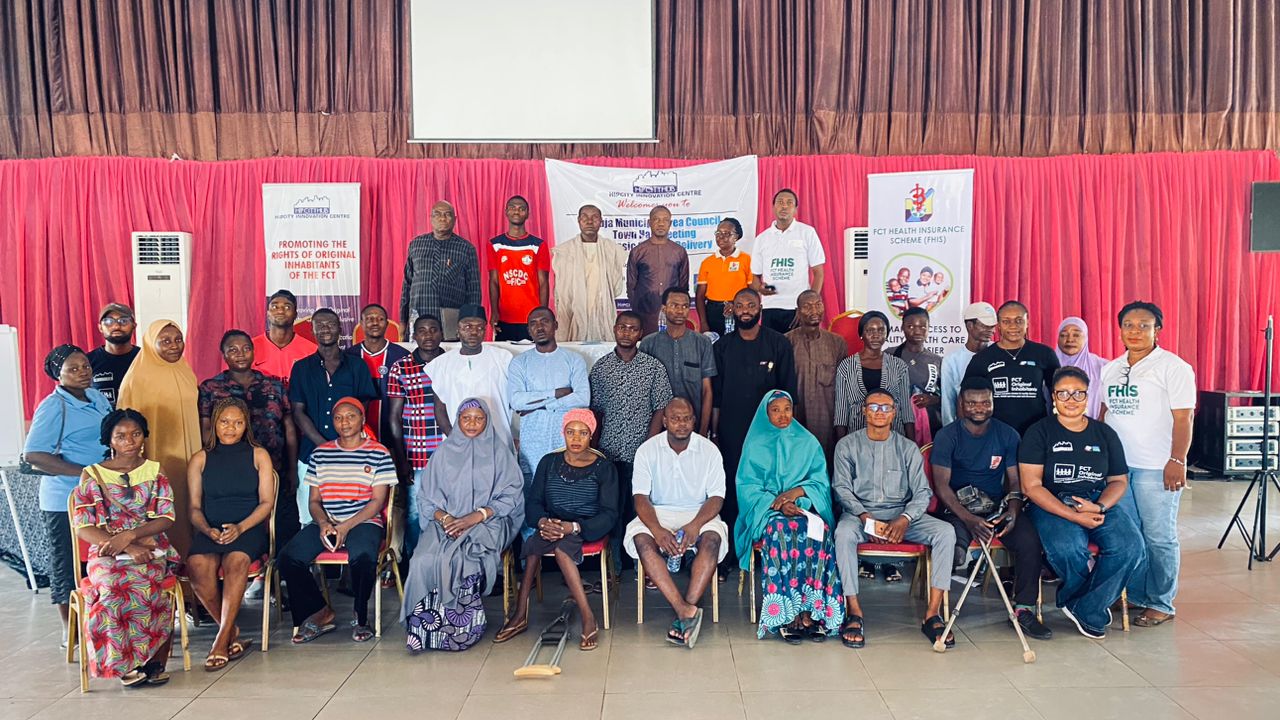At a recent town hall meeting organized by the HipCity Innovation Centre, in the suburb of Karu on the outskirts of the Nigerian capital, Original Inhabitants in the Federal Capital Territory (FCT) discussed the daily challenges they face in accessing basics social services. Participants at the meeting lamented inadequacy of social goods such as regular and reliable electricity, good access roads, potable water, schools, and other amenities to make life livable.
In his opening remarks, Executive Director of HipCity Innovation Centre, Mr. Bassey Bassey said the town hall was an opportunity for exchange of ideas between the government and the governed. He said with such dialogue platforms, the people will have the opportunity to present their demands to the government, while those in government will take away valuable lessons for the implementation of policies and programs for the benefit of the people. It was also noted that the town hall was an avenue for the people to have a sense of belonging about what government is doing and to bridge the communication gap between the people and those in the corridors of power.
One of the issues discussed was the FCT Health Issuance Scheme, which participants sought to have more information about in terms of how they can participate in the scheme. According to a top official of the scheme, Mrs Folarin Folake the health insurance provides a platform that enables the people to enroll for free health care delivery services. She further explained that the scheme is categorized into three sectors which are: the formal sector, which is for government employees, while the informal sector covers those in the private sector, market women, the vulnerable and the poor.
She said: “The program has been designed to take care of the vulnerable and the poor. In the whole of AMMAC, the initiatives have enrolled over 6000 people, while in the whole of the FCT, over 27,000 persons have benefited from the program.” According to her, the people are benefiting from three free basic health care schemes. She also spoke on the need for citizens to be sensitized, especially for religious leaders to pass the information about the scheme through their various churches, mosques and their traditional leaders, especially as the program is totally free.
Also, Mr. Dalamu Umoru Katampe, the Head of Department Planning Partnership Monitoring and Evaluation FCT, Rural Water and Sanitation Agency (RUWASSA) said the agency provided 62 hand pumps to solve the problem of critical water scarcity in the area, especially during the 2020/2021 cholera outbreak. He said the agency later provided 50 hand pumps and six solar water bore holes in FCT communities.
His words: “When we provided the facility scheme, we organized the water sanitation health committees within the community, and trained them how to maintain the facilities and they sometimes intervene when the need arises. Efforts are ongoing to provide water for communities that are critically in need of water of supply. There was a report of a village Maraba Tancoshara after Apo on the way to the Internally Displaced Peoples (IDP) camp where we discovered the serious level of scarcity of potable water and we are trying to see how we can provide safe drinking water for the community.” On his part, Mr. Tanko Nudu, the Madawaki of Jiwa highlighted the challenges the people are facing in respect of access to potable water. He said some of the villages do not have access to health care services and they are also being faced by the challenge of high rate of school fees.
READ ALSO:Peace Mass Transit’s No Refund Policy Court Case: Wages of Poor Customer Service
“We have complained to the appropriate quarters and they have promised to take necessary actions.” He also noted that original inhabitants in various communities have been seeing the efforts being made to alleviate the sufferings of the people, just as he appealed to the government to do more.
Solomon Johnson, Deputy Director in charge of schools in the FCT said efforts are being made to improve the school structures due to the rising population of the territory. He said: “Part of our efforts is to ensure indigenes of the FCT benefit from education and scholarship scheme and yearly renovation of schools. Also, as a result of the insecurity facing schools, efforts are being made to recruit and deploy security personnel for the safety of school children. The town hall engagement, which is part of the HipCity Innovation Centre’s project of promoting the rights of the Original Inhabitants in the FCT provided a platform for the people to interact with duty bearers, while given the marginalized groups access to those representing them.













